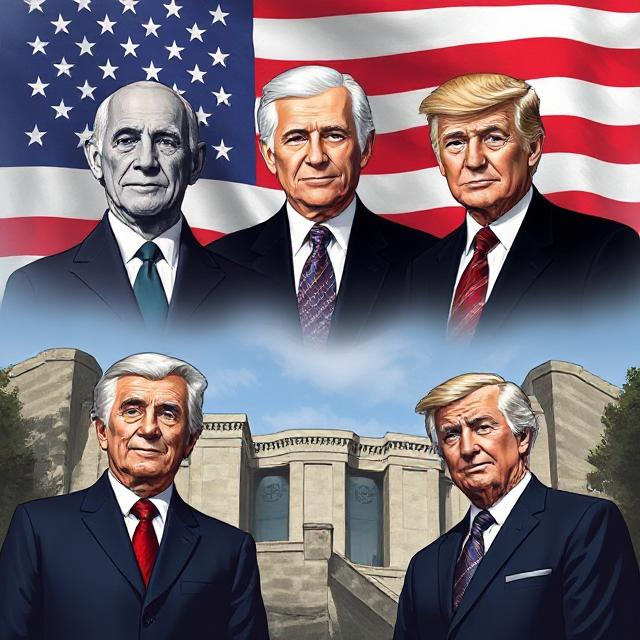The presidency of the United States is one of the most powerful and influential positions in the world. Since the establishment of the office in 1789, 46 individuals have served as President, each leaving a unique mark on the nation’s history. This article provides a detailed overview of the Presidents of the United States, exploring their backgrounds, major accomplishments, challenges faced, and the historical context of their administrations.
The Early Presidents (1789-1825)
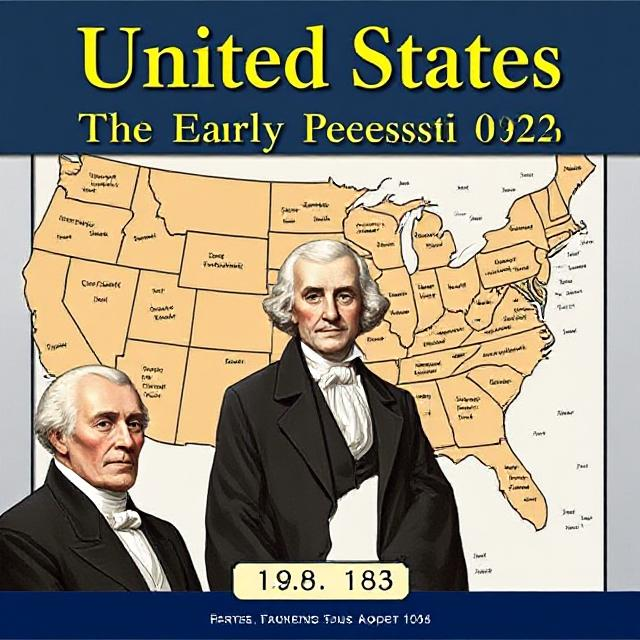
George Washington (1789-1797)
Background: Born on February 22, 1732, in Westmoreland County, Virginia, Washington was a planter and soldier. He gained prominence as a commander during the French and Indian War and later led the Continental Army to victory in the American Revolutionary War.
Major Accomplishments:
Precedents: Washington established many protocols for the new government, including the formation of a Cabinet and the tradition of a two-term limit.
Neutrality: He advocated for neutrality in foreign conflicts, warning against entangling alliances in his Farewell Address.
Whiskey Rebellion: He quelled the Whiskey Rebellion in 1794, asserting federal authority.
Challenges: Washington faced challenges such as economic instability, political factionalism, and international threats from Britain and France.
John Adams (1797-1801)
Background: Born on October 30, 1735, in Braintree, Massachusetts, Adams was a lawyer and a leading advocate for independence. He served as a delegate to the Continental Congress and played a pivotal role in the Declaration of Independence.
Major Accomplishments:
Peace with France: Adams successfully avoided war with France during the Quasi-War, promoting diplomacy over conflict.
Alien and Sedition Acts: He enacted laws to suppress dissent, which were controversial and led to significant opposition.
Challenges: Adams faced intense political rivalry, particularly from Thomas Jefferson and the Democratic-Republicans, leading to a contentious election in 1800.
Thomas Jefferson (1801-1809)
Background: Born on April 13, 1743, in Shadwell, Virginia, Jefferson was a plantation owner, philosopher, and statesman. He was the principal author of the Declaration of Independence and served as the U.S. Minister to France.
Major Accomplishments:
Louisiana Purchase: In 1803, Jefferson completed the Louisiana Purchase, acquiring vast territories from France, which doubled the size of the nation.
Lewis and Clark Expedition: He commissioned Meriwether Lewis and William Clark to explore the newly acquired lands, enhancing knowledge of the geography and indigenous cultures.
Challenges: Jefferson grappled with issues such as the Embargo Act of 1807, which aimed to avoid war with Britain but led to economic hardship.
James Madison (1809-1817)
Background: Born on March 16, 1751, in Port Conway, Virginia, Madison was a key architect of the Constitution and a strong advocate for the Bill of Rights. He served as Secretary of State under Jefferson.
Major Accomplishments:
War of 1812: Madison led the nation during the War of 1812 against Great Britain, which, despite initial setbacks, fostered a sense of national unity and pride.
Second Bank of the United States: He supported the establishment of the Second Bank, improving the nation’s financial stability.
Challenges: Madison faced opposition from the Federalists and the challenges of wartime governance, including military defeats and economic strain.
James Monroe (1817-1825)
Background: Born on April 28, 1758, in Westmoreland County, Virginia, Monroe was a soldier, diplomat, and statesman. He served as a governor of Virginia and held various diplomatic positions.
Major Accomplishments:
Monroe Doctrine: In 1823, Monroe articulated the Monroe Doctrine, a policy that warned European nations against further colonization in the Americas, asserting U.S. influence in the Western Hemisphere.
Era of Good Feelings: His presidency is often associated with a period of national unity and political harmony, following the War of 1812.
Challenges: Monroe faced economic difficulties, including the Panic of 1819, and regional tensions over slavery and states’ rights.
The Antebellum Presidents (1825-1860)
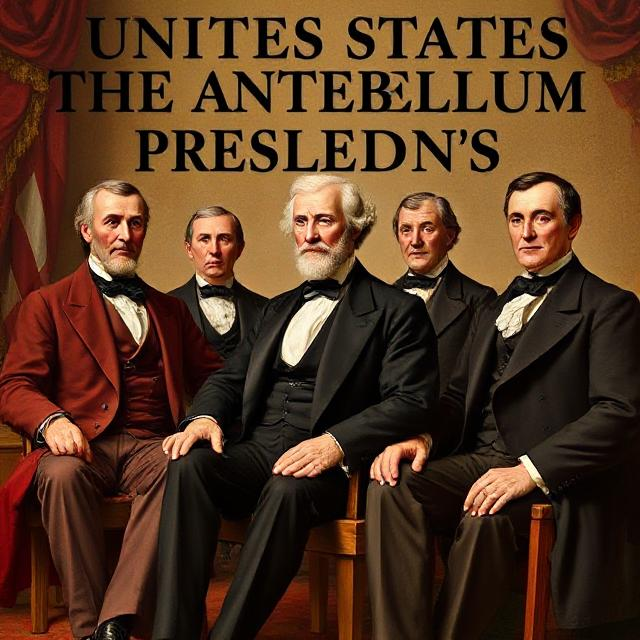
John Quincy Adams (1825-1829)
Background: Born on July 11, 1767, in Braintree, Massachusetts, Adams was the son of John Adams. He served as a diplomat and held various governmental positions before his presidency.
Major Accomplishments:
Internal Improvements: Advocated for federal funding for infrastructure projects, including roads and canals, to promote economic growth.
Tariff of 1828: Supported protective tariffs to benefit Northern industries, which angered Southern states.
Challenges: His presidency was marked by political opposition and accusations of corruption, particularly regarding the “Corrupt Bargain” that secured his election.
Andrew Jackson (1829-1837)
Background: Born on March 15, 1767, in Waxhaws, South Carolina, Jackson was a military hero and a populist leader known for his strong personality and controversial policies.
Major Accomplishments:
Indian Removal Act: Enforced policies leading to the forced relocation of Native American tribes, known as the Trail of Tears.
Bank War: Opposed the Second Bank of the United States, leading to its eventual demise and the rise of state banks.
Challenges: Jackson faced significant opposition from political rivals and dealt with sectional tensions over slavery and states’ rights.
Martin Van Buren (1837-1841)
Background: Born on December 5, 1782, in Kinderhook, New York, Van Buren was a key organizer of the Democratic Party and served as Jackson’s vice president.
Major Accomplishments:
Panic of 1837: Managed the economic crisis that erupted shortly after he took office, advocating for limited government intervention.
Independent Treasury Act: Established an independent treasury system to manage federal funds without reliance on private banks.
Challenges: Van Buren struggled to address the economic downturn and faced criticism for his handling of the crisis.
William Henry Harrison (1841)
Background: Born on February 9, 1773, in Charles City County, Virginia, Harrison was a military officer and politician known for his role in the Battle of Tippecanoe.
Major Accomplishments:
Short Presidency: Harrison served the shortest presidency in U.S. history, dying just 31 days after taking office.
Challenges: His administration faced challenges related to the Whig Party’s internal divisions and the ongoing debate over slavery.
John Tyler (1841-1845)
Background: Born on March 29, 1790, in Charles City County, Virginia, Tyler was a statesman and politician who became president after Harrison’s death.
Major Accomplishments:
Annexation of Texas: Tyler supported the annexation of Texas, which became a contentious issue leading to the Mexican-American War.
Veto of Bank Legislation: He vetoed attempts to re-establish a national bank, leading to conflicts with his own party.
Challenges: Tyler faced opposition from both Democrats and Whigs, struggling to maintain support within his party.
James K. Polk (1845-1849)
Background: Born on November 2, 1795, in Mecklenburg County, North Carolina, Polk was a strong proponent of Manifest Destiny and expansionism.
Major Accomplishments:
Mexican-American War: Led the nation during the war, resulting in significant territorial gains, including California and New Mexico.
Oregon Treaty: Settled the Oregon boundary dispute with Britain, securing the Pacific Northwest for the U.S.
Challenges: Polk faced opposition from anti-war factions and dealt with the consequences of territorial expansion, including debates over slavery in new territories.
Zachary Taylor (1849-1850)
Background: Born on November 24, 1784, in Barboursville, Virginia, Taylor was a career military officer and a national hero from the Mexican-American War.
Major Accomplishments:
Opposition to Compromise: Taylor opposed the extension of slavery into new territories, advocating for California’s admission as a free state.
Challenges: Taylor’s presidency was cut short by his death after just 16 months in office, leaving unresolved tensions over slavery.
Millard Fillmore (1850-1853)
Background: Born on January 7, 1800, in Summerhill, New York, Fillmore was a politician and lawyer who became president after Taylor’s death.
Major Accomplishments:
Compromise of 1850: Supported the legislation aimed at easing tensions between slave and free states, including the Fugitive Slave Act.
Challenges: Fillmore faced criticism from both pro-slavery and anti-slavery factions, struggling to maintain national unity.
Franklin Pierce (1853-1857)
Background: Born on November 23, 1804, in Hillsborough, New Hampshire, Pierce was a Democratic politician and a veteran of the Mexican-American War.
Major Accomplishments:
Kansas-Nebraska Act: Supported the act that allowed territories to decide on slavery, leading to violent conflicts known as “Bleeding Kansas.”
Challenges: Pierce’s presidency was marked by increasing sectional tensions and a decline in the Democratic Party’s popularity.
James Buchanan (1857-1861)
Background: Born on April 23, 1791, in Mercersburg, Pennsylvania, Buchanan was a seasoned politician and diplomat before becoming president.
Major Accomplishments:
Dred Scott Decision: His presidency coincided with the Supreme Court’s Dred Scott decision, which heightened tensions over slavery.
Challenges: Buchanan faced a divided nation on the brink of civil war, struggling to find effective solutions to secessionist sentiments.
The Civil War and Reconstruction Presidents (1861-1877)
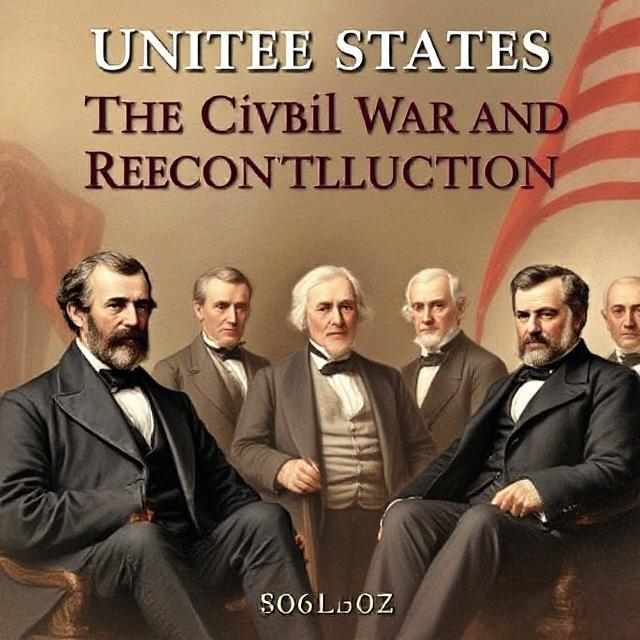
Abraham Lincoln (1861-1865)
Background: Born on February 12, 1809, in Hardin County, Kentucky, Lincoln rose from humble beginnings to become a lawyer and politician in Illinois.
Major Accomplishments:
Emancipation Proclamation: Issued in 1863, it declared the freedom of all enslaved people in Confederate-held territory.
Preservation of the Union: Led the nation through the Civil War, emphasizing unity and the principles of democracy.
Challenges: Lincoln faced immense challenges, including military setbacks, political opposition, and the moral complexities of war.
Andrew Johnson (1865-1869)
Background: Born on December 29, 1808, in Raleigh, North Carolina, Johnson was a tailor and politician who became president after Lincoln’s assassination.
Major Accomplishments:
Reconstruction Policies: Implemented lenient policies for Southern states, aiming for rapid reintegration into the Union.
Challenges: Johnson faced opposition from Congress, leading to his impeachment in 1868, though he was acquitted by one vote.
Ulysses S. Grant (1869-1877)
Background: Born on April 27, 1822, in Point Pleasant, Ohio, Grant was a military leader during the Civil War and became a national hero.
Major Accomplishments:
Civil Rights Enforcement: Supported the 15th Amendment and worked to protect the rights of African Americans during Reconstruction.
Economic Recovery: Focused on rebuilding the economy after the war and addressing corruption in government.
Challenges: Grant’s presidency faced scandals and economic turmoil, including the Panic of 1873, which overshadowed his achievements.
The Gilded Age Presidents (1877-1901)
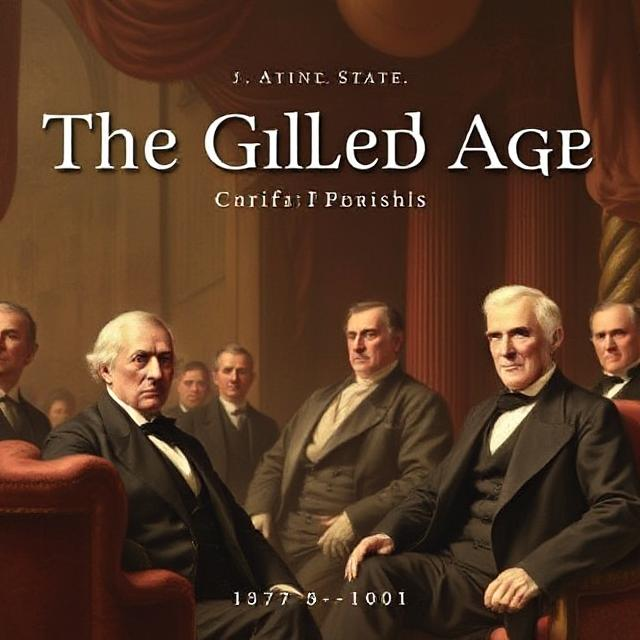
Rutherford B. Hayes (1877-1881)
Background: Born on October 4, 1822, in Delaware, Ohio, Hayes was a lawyer and Union general during the Civil War.
Major Accomplishments:
End of Reconstruction: Oversaw the withdrawal of federal troops from the South, effectively ending Reconstruction.
Civil Service Reform: Advocated for reforms to reduce corruption in government appointments.
Challenges: Hayes faced opposition from both Democrats and Republicans, navigating a divided political landscape.
James A. Garfield (1881)
Background: Born on November 19, 1831, in Moreland Hills, Ohio, Garfield was a Civil War general and a congressman before becoming president.
Major Accomplishments:
Civil Service Reform Advocacy: Promoted reforms to reduce patronage and improve government efficiency.
Challenges: Garfield’s presidency was cut short by assassination, leading to a national outpouring of grief.
Chester A. Arthur (1881-1885)
Background: Born on October 5, 1829, in Fairfield, Vermont, Arthur was a lawyer and politician who became president after Garfield’s assassination.
Major Accomplishments:
Pendleton Act: Signed the Pendleton Civil Service Reform Act, which established a merit-based system for federal employment.
Challenges: Arthur faced challenges in balancing party loyalty with the need for reform in government practices.
Grover Cleveland (1885-1889)
Background: Born on March 18, 1837, in Caldwell, New Jersey, Cleveland was a lawyer and politician who served two non-consecutive terms as president.
Major Accomplishments:
Vetoes: Known for his extensive use of veto power, he opposed excessive government spending and favored limited government.
Challenges: Cleveland faced economic challenges, including the Panic of 1893, which led to significant unemployment and unrest.
Benjamin Harrison (1889-1893)
Background: Born on August 20, 1833, in North Bend, Ohio, Harrison was a lawyer and military officer who became president after defeating Cleveland.
Major Accomplishments:
Sherman Antitrust Act: Signed the first federal antitrust law to combat monopolies and promote competition.
Challenges: Harrison faced opposition from Democrats and struggled with economic issues during his presidency.
Grover Cleveland (1893-1897)
Background: Cleveland returned to the presidency for his second term, making him the only president to serve two non-consecutive terms.
Major Accomplishments:
Intervention in the Pullman Strike: Responded to the nationwide strike by sending federal troops to break it, asserting federal authority.
Challenges: Cleveland faced significant political opposition and economic turmoil, including the effects of the Panic of 1893.
William McKinley (1897-1901)
Background: Born on January 29, 1843, in Niles, Ohio, McKinley was a Civil War veteran and a congressman before becoming president.
Major Accomplishments:
Spanish-American War: Led the nation during the war, resulting in the acquisition of territories such as Puerto Rico, Guam, and the Philippines.
Economic Recovery: His presidency saw economic growth and the establishment of protective tariffs.
Challenges: McKinley faced domestic unrest, including labor strikes, and was assassinated in 1901, leading to significant national mourning.
The Progressive Era Presidents (1901-1921)
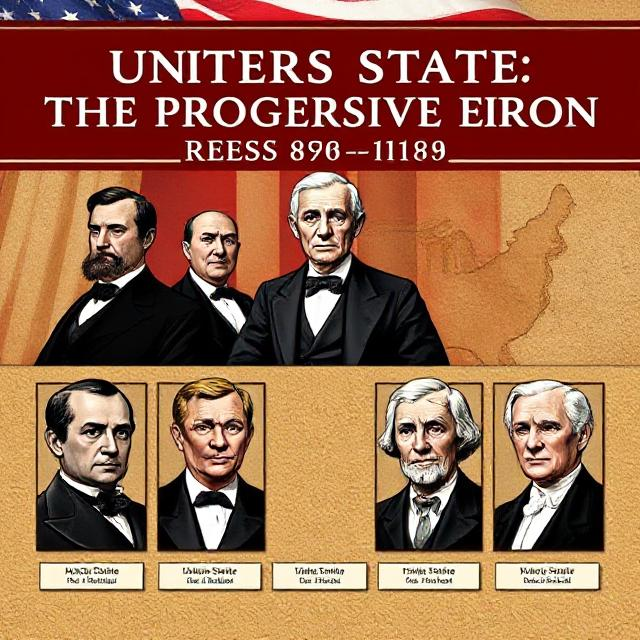
Theodore Roosevelt (1901-1909)
Background: Born on October 27, 1858, in New York City, Roosevelt was a soldier, author, and reformer who became president after McKinley’s assassination.
Major Accomplishments:
Progressive Reforms: Championed progressive reforms, including trust-busting, labor rights, and environmental conservation.
Panama Canal: Oversaw the construction of the Panama Canal, enhancing U.S. maritime trade.
Challenges: Roosevelt faced opposition from conservative factions within his party and dealt with growing tensions over labor rights.
William Howard Taft (1909-1913)
Background: Born on September 15, 1857, in Cincinnati, Ohio, Taft was Roosevelt’s handpicked successor and a former judge.
Major Accomplishments:
Trust-Busting: Continued Roosevelt’s antitrust policies, filing more suits against monopolies than his predecessor.
Income Tax: Supported the 16th Amendment, allowing for a federal income tax.
Challenges: Taft faced a split in the Republican Party, leading to the rise of the Progressive Party and the candidacy of Roosevelt.
Woodrow Wilson (1913-1921)
Background: Born on December 28, 1856, in Staunton, Virginia, Wilson was a scholar and president of Princeton University before entering politics.
Major Accomplishments:
New Freedom: Implemented progressive reforms, including banking and tariff reforms, and supported the Federal Reserve Act.
World War I Leadership: Led the nation during WWI and proposed the Fourteen Points, advocating for peace and the League of Nations.
Challenges: Wilson faced opposition to his international vision and struggled with domestic issues, including civil rights and labor unrest.
The Roaring Twenties and the Great Depression Presidents (1921-1945)

Warren G. Harding (1921-1923)
Background: Born on November 2, 1865, in Blooming Grove, Ohio, Harding was a newspaper publisher and politician who became president after a landslide victory in 1920.
Major Accomplishments:
Return to Normalcy: Harding promoted a return to pre-war normalcy, advocating for limited government and business-friendly policies.
Economic Growth: His administration saw economic expansion and a focus on domestic issues.
Challenges: Harding’s presidency was marred by scandals, including the Teapot Dome scandal, which involved bribery and corruption among his cabinet members.
Calvin Coolidge (1923-1929)
Background: Born on July 4, 1872, in Plymouth Notch, Vermont, Coolidge was a lawyer and politician who became president after Harding’s death.
Major Accomplishments:
Economic Prosperity: Coolidge presided over a period of significant economic growth, promoting policies that favored business and reduced taxes.
Immigration Act of 1924: Signed legislation that limited immigration, reflecting nativist sentiments of the time.
Challenges: Coolidge faced criticism for his hands-off approach to governance and the growing disparity between wealth and poverty.
Herbert Hoover (1929-1933)
Background: Born on August 10, 1874, in West Branch, Iowa, Hoover was an engineer and businessman before entering politics, serving as Secretary of Commerce.
Major Accomplishments:
Public Works Projects: Initiated significant public works projects, including the Hoover Dam, to combat unemployment.
Challenges: Hoover’s presidency was dominated by the Great Depression, which began shortly after he took office. His policies were widely criticized as ineffective, leading to widespread suffering.
Franklin D. Roosevelt (1933-1945)
Background: Born on January 30, 1882, in Hyde Park, New York, Roosevelt was a distant cousin of Theodore Roosevelt and served as Assistant Secretary of the Navy.
Major Accomplishments:
New Deal: Implemented the New Deal, a series of programs and reforms aimed at economic recovery, social security, and labor rights.
World War II Leadership: Led the nation during WWII, forming alliances and directing military strategy, including the establishment of the United Nations.
Challenges: Roosevelt faced opposition from conservatives and dealt with the complexities of global conflict, including the attack on Pearl Harbor in 1941.
The Post-War Presidents (1945-1969)
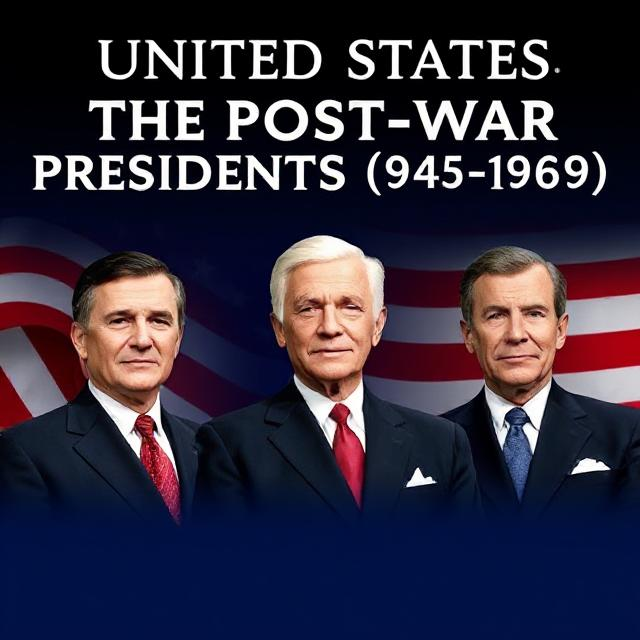
Harry S. Truman (1945-1953)
Background: Born on May 8, 1884, in Lamar, Missouri, Truman was a farmer and politician who became president upon Roosevelt’s death.
Major Accomplishments:
Marshall Plan: Launched the Marshall Plan to aid European recovery after WWII, promoting economic stability and preventing the spread of communism.
NATO Formation: Supported the establishment of NATO, strengthening alliances against the Soviet Union.
Challenges: Truman faced challenges related to the Cold War, including the Korean War and domestic issues like inflation and labor strikes.
Dwight D. Eisenhower (1953-1961)
Background: Born on October 14, 1890, in Denison, Texas, Eisenhower was a five-star general in the U.S. Army and Supreme Commander of Allied Forces during WWII.
Major Accomplishments:
Interstate Highway System: Initiated the construction of the interstate highway system, transforming American infrastructure and economy.
Cold War Policies: Adopted a policy of containment against communism and emphasized nuclear deterrence.
Challenges: Eisenhower faced challenges related to civil rights movements and the escalation of the Cold War, including the Suez Crisis.
John F. Kennedy (1961-1963)
Background: Born on May 29, 1917, in Brookline, Massachusetts, Kennedy was a World War II veteran and U.S. Senator before becoming president.
Major Accomplishments:
Cuban Missile Crisis: Successfully navigated the Cuban Missile Crisis in 1962, averting nuclear war with the Soviet Union.
Civil Rights Advocacy: Promoted civil rights legislation and set the stage for future reforms.
Challenges: Kennedy faced significant challenges related to civil rights, foreign policy tensions, and ultimately, his assassination in 1963.
Lyndon B. Johnson (1963-1969)
Background: Born on August 27, 1908, in Stonewall, Texas, Johnson served as a U.S. Representative and Senate Majority Leader before becoming president after Kennedy’s assassination.
Major Accomplishments:
Great Society: Launched the Great Society programs, focusing on civil rights, healthcare (Medicare and Medicaid), and education reforms.
Civil Rights Act of 1964: Signed landmark legislation prohibiting discrimination based on race, color, religion, sex, or national origin.
Challenges: Johnson faced backlash over the Vietnam War, leading to widespread protests and a decline in public support.
The Late 20th Century Presidents (1969-2001)
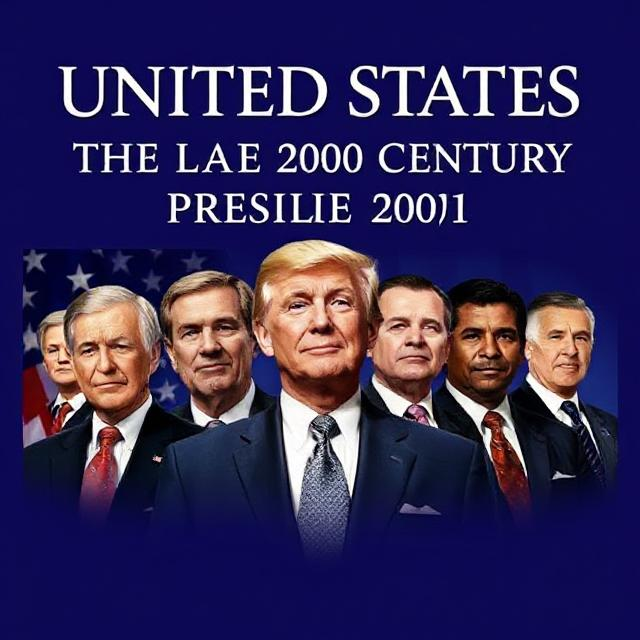
Richard Nixon (1969-1974)
Background: Born on January 9, 1913, in Yorba Linda, California, Nixon was a World War II veteran and previously served as Vice President under Eisenhower.
Major Accomplishments:
Opening Relations with China: Initiated diplomatic relations with the People’s Republic of China, reshaping global politics.
Environmental Reforms: Established the Environmental Protection Agency (EPA) and signed important environmental legislation.
Challenges: Nixon’s presidency was marred by the Watergate scandal, leading to his resignation in 1974, the first president to do so.
Gerald Ford (1974-1977)
Background: Born on July 14, 1913, in Omaha, Nebraska, Ford was a World War II veteran and long-serving congressman who became president after Nixon’s resignation.
Major Accomplishments:
Pardon of Nixon: Granted a controversial pardon to Nixon, aiming to heal the nation but facing backlash.
Economic Challenges: Dealt with stagflation, a combination of inflation and unemployment, implementing policies to stabilize the economy.
Challenges: Ford faced criticism for his handling of the economy and challenges related to public trust in government.
Jimmy Carter (1977-1981)
Background: Born on October 1, 1924, in Plains, Georgia, Carter was a peanut farmer and governor of Georgia before becoming president.
Major Accomplishments:
Camp David Accords: Brokered peace between Israel and Egypt, a significant achievement in Middle Eastern diplomacy.
Human Rights Advocacy: Emphasized human rights in foreign policy, promoting democratic values globally.
Challenges: Carter faced economic difficulties, including the energy crisis and high inflation, as well as the Iran Hostage Crisis.
Ronald Reagan (1981-1989)
Background: Born on February 6, 1911, in Tampico, Illinois, Reagan was an actor and governor of California before his presidency.
Major Accomplishments:
Economic Policies: Implemented supply-side economics, leading to tax cuts and economic growth, known as “Reaganomics.”
Cold War Strategies: Took a hard stance against the Soviet Union, contributing to the end of the Cold War.
Challenges: Reagan faced challenges related to domestic policy, including the AIDS crisis and rising income inequality.
George H.W. Bush (1989-1993)
Background: Born on June 12, 1924, in Milton, Massachusetts, Bush was a World War II veteran, businessman, and Vice President under Reagan.
Major Accomplishments:
Gulf War: Led a coalition to liberate Kuwait from Iraqi occupation during the Gulf War in 1991.
End of the Cold War: Played a role in the peaceful dissolution of the Soviet Union and the end of the Cold War.
Challenges: Bush faced economic recession and rising discontent over domestic issues, leading to his defeat in the 1992 election.
Bill Clinton (1993-2001)
Background: Born on August 19, 1946, in Hope, Arkansas, Clinton was a lawyer and governor of Arkansas before his presidency.
Major Accomplishments:
Economic Prosperity: Oversaw a period of economic growth, budget surpluses, and low unemployment.
Welfare Reform: Implemented significant welfare reforms and expanded access to health care.
Challenges: Clinton faced impeachment in 1998 related to the Monica Lewinsky scandal, though he was acquitted by the Senate.
The 21st Century Presidents (2001-Present)
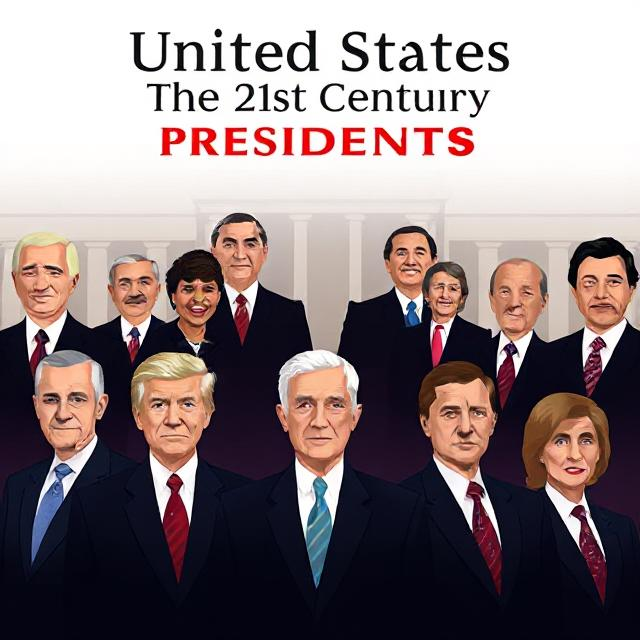
George W. Bush (2001-2009)
Background: Born on July 6, 1946, in New Haven, Connecticut, Bush was a businessman and governor of Texas before becoming president.
Major Accomplishments:
Response to 9/11: Led the nation in response to the September 11, 2001, terrorist attacks, initiating the War on Terror.
No Child Left Behind Act: Implemented educational reforms aimed at improving student performance.
Challenges: Bush faced criticism for the Iraq War and economic challenges, including the 2008 financial crisis.
Barack Obama (2009-2017)
Background: Born on August 4, 1961, in Honolulu, Hawaii, Obama was a lawyer and U.S. Senator from Illinois before becoming president.
Major Accomplishments:
Affordable Care Act: Enacted healthcare reform that expanded access to insurance and aimed to reduce costs.
Dodd-Frank Act: Implemented financial reforms in response to the 2008 financial crisis to prevent future economic downturns.
Challenges: Obama faced significant political polarization and challenges related to foreign policy, including conflicts in the Middle East.
Donald Trump (2017-2021)
Background: Born on June 14, 1946, in Queens, New York City, Trump was a businessman and television personality before entering politics.
Major Accomplishments:
Tax Cuts and Jobs Act: Enacted significant tax reforms aimed at stimulating economic growth.
Judicial Appointments: Appointed three Supreme Court justices, reshaping the judiciary.
Challenges: Trump’s presidency was marked by controversy, including two impeachments and significant social and political unrest.
Joe Biden (2021-Present)
Background: Born on November 20, 1942, in Scranton, Pennsylvania, Biden was a long-serving U.S. Senator and Vice President under Obama.
Major Accomplishments:
COVID-19 Response: Implemented measures to address the COVID-19 pandemic, including vaccination efforts and economic relief packages.
Infrastructure Investment: Passed a significant infrastructure bill aimed at modernizing transportation and utilities.
Challenges: Biden faces ongoing challenges related to political division, economic recovery, and international relations.
Conclusion
The Presidents of the United States have played pivotal roles in shaping the nation’s history, each facing unique challenges and opportunities. From the early leaders who established the framework of the government to modern presidents navigating complex global issues, their legacies continue to influence American society and politics. Understanding the contributions and challenges of each president provides valuable insights into the evolution of the United States.


